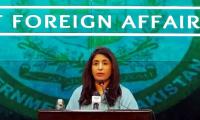ISLAMABAD: A man of meagre financial means has been trying to re-enter South Korea through legal means for 17 years to be with his Korean wife but all his efforts so far have been in vain. But there is finally a ray of hope.
Ghulam Abbas, who was 34 when his troubles began, has not been able to go back to South Korea because, according to documents available with The News, a fellow Pakistani impersonating him had misused his passport particulars.
A case registered by the Federal Investigation Agency (FIA) after a delay of 15 years against the alleged impersonator, Sajid Mahmood, will be taken up for hearing on Wednesday by an Islamabad judge dealing with such matters.
When Ghulam Abbas was in South Korea, he became involved with a woman who later came to Pakistan to tie the knot with him. She went back home and repeatedly wrote to her embassy in Pakistan to issue a visa to her husband so that he could join her in Korea. However, he was refused a visa on the grounds that he had earlier been deported from South Korea.
Way back on November 18, 2003, Imtiaz Hussain, Counsellor at the Pakistan Embassy in Seoul, had written a letter on a ‘forgery case’ to the immigration and passport director general Islamabad, seeking action against the impersonator Sajid Mahmood.
The letter said the embassy was approached on December 13, 2002 by a destitute Pakistani national, claiming to be Ghulam Abbas, with a request for the issuance of an exit document in lieu of his lost passport. According to the man, his father had died in Pakistan and he had to travel back home immediately. Keeping in view the humanitarian aspect of this case, the embassy issued him an out-pass enabling him to travel back to Pakistan, the letter said.
However, the letter added that it was revealed later that the man who had approached the embassy was not Ghulam Abbas but Sajid Mahmood, son of of Ahmad Din, a resident of Phalia, Mandi Bahauddin. Mahmood had used the passport particulars of Ghulam Abbas, also from the same area, to deceive the embassy and the Korean authorities. The real Ghulam Abbas appeared before the embassy in November,2003 with his original passport and other papers, the letter said.
The letter further said that the embassy is enclosing an enlarged copy of Sajid Mahmood’s photograph with the request that he may be traced and prosecuted in Pakistan for forgery and impersonation. He should also be blacklisted by the passport authorities so he is unable to obtain new travel documents in future.
According to details, the victim of this scam, Ghulam Abbas, went to South Korea on a legal work permit but was deported for no fault of his own.
He had approached the Pakistan Embassy in South Korea on December 13, 2002 to resolve his issue but the mission took notice of his case a year later on November 18, 2003 (as per the counsellor’s letter).
Back in Pakistan, after many efforts, an FIR was registered against the accused in 2018 with the direct intervention of the then FIA chief. Sajid Mahmood was arrested and was later released on bail.
During his ordeal, he had also approached the South Korean immigration office to get a routine, annual renewal of his work permit. But he was told to leave the country or face a jail term and a fine.
He was told by the Korean authorities that, according to their record, he has already left South Korea. That is when he came to know that someone else had exited South Korea using a fake passport carrying his name.
Abbas, armed with his passport, rushed to the Pakistan embassy to seek its help. He got a brief audience with the then ambassador and that too when he sent in a chit saying he was the nephew of an ex-member of the National Assembly, which he was not.
The ambassador told him that this was not a case that the Pakistan mission could deal with, and it was up to the South Korean immigration authorities to tackle it. Ghulam Abbas was asked to contact them again.
After his meeting with Pakistan’s ambassador to South Korea in Seoul, Ghulam Abbas did not know which other door he could knock on to get justice. Like many other Pakistanis, he was also left in the lurch partially due to the unfriendly post-9/11 global atmosphere and legislation.
Ghulam Abbas was the only supporter of his family back in Pakistan. Before his ordeal unfolded, he had been working in South Korea for two and a half years. He had gone there legally and had been employed by an automobile spare parts manufacturing unit in the suburbs of Seoul.
After his14-hour daily duty, he used to earn $650 per month and had to spend nights in a tiny uncomfortable container with two more people, sharing a common toilet with about two dozen factory workers. Only then could he save $500 and send it back home in the hope that his
family could eke out a decent living.
Ghulam Abbas says if Sajid Mahmood is found guilty by the court, he would finally be able to prove to the South Korean embassy that he was wronged by the accused. Therefore, he should be issued a visa so that he could reunite with his Korean wife.
During the meeting, the duo discussed human rights situation in the Indian Illegally Occupied Jammu and Kashmir
Poliovirus in Quetta was detected in the environmental sample collected on March 26, 2024, from the ‘Surpul’...
Local police and the district administration reached the scene and evacuated the staff
Court also directed the speaker of the KP Assembly to carry out his constitutional responsibilities and administer...
Director-General Zafar Sultan and senior journalist Siddique Sajid were among 12 Namazis at Jumaa prayers who lost...
According to Pakistan High Commission in London, Gen Sanders stated that there was no comparison to the Pakistan...







